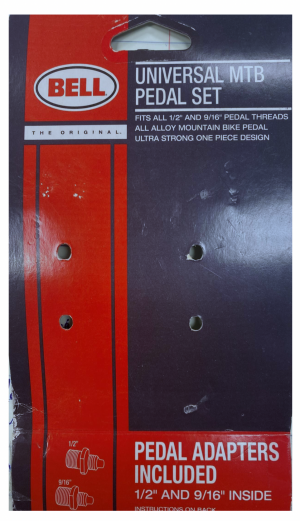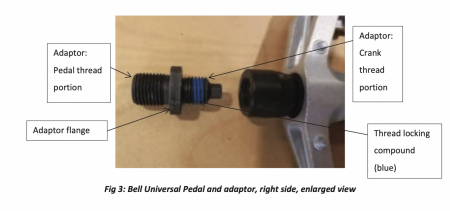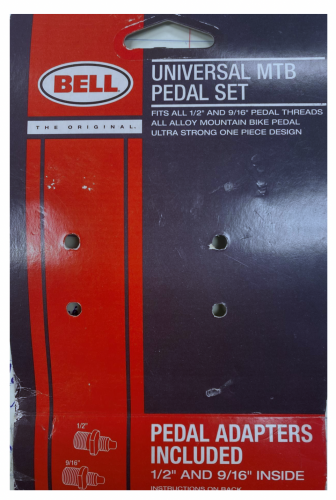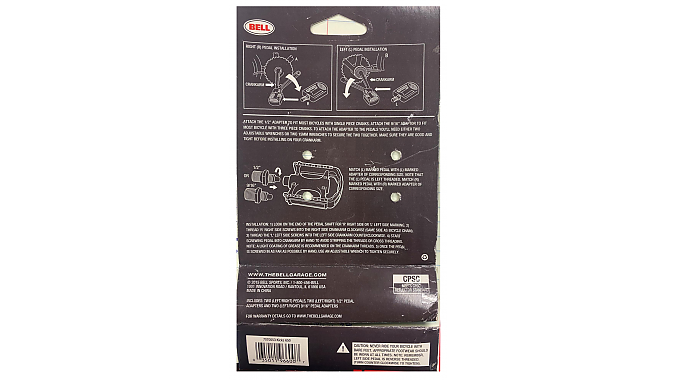INDIANAPOLIS (BRAIN) — Bell Sports has settled a product liability suit filed by an Indiana woman who said her Bell Universal pedal broke off while she was riding, causing a crash and injuries. The suit said the woman suffered damages totaling nearly $5 million.
Bell's Universal pedal fits both ½-inch and 9/16-inch cranks thanks to included adapters that thread into crank arms; the pedals' non-standard axles then thread onto the adapters.
A jury trial had been scheduled to begin Dec. 5 in the U.S. District Court for the Southern District of Indiana in Indianapolis. But on Tuesday both sides told the court they had agreed to a settlement. The court gave them 30 days to file a joint motion to dismiss the case.
A spokesman for Bell, which is owned by Vista Outdoor, said the company would have no comment on the settlement. Terms were not released.
 According to the complaint, plaintiff Kasey Sandlin crashed in August 2018 when the Bell alloy pedal on her bike “suffered a catastrophic failure.” The suit claimed she “experienced traumatic, permanent and painful injuries, including a traumatic brain injury, incurred medical expenses, pain and suffering and other pecuniary damages.”
According to the complaint, plaintiff Kasey Sandlin crashed in August 2018 when the Bell alloy pedal on her bike “suffered a catastrophic failure.” The suit claimed she “experienced traumatic, permanent and painful injuries, including a traumatic brain injury, incurred medical expenses, pain and suffering and other pecuniary damages.”
In a July 2021 filing, Sandlin’s attorneys said she had suffered damages totaling $4,789,040.
The suit said the Bell pedal and adapter system was defective and “unreasonably dangerous.”
In court filings, Bell said it developed, designed, and marketed the pedals and adapters in conjunction with manufacturer Ningo Detai Machinery Co. Ltd. in YinJiang Ningbo, China. Bell denied that the pedals were defective or that it was responsible for Sandlin’s injuries and asserted that it did not manufacture the pedals. Ningo Detai was not a party in the case.
One expert for Sandlin filed pre-trial testimony that said the right pedal on Sandlin’s bike partially unthreaded from the crank adapter, leading to a fatigue crack on the adapter and its eventual failure and the separation of the pedal from the bike when Sandlin rode it.
The expert (Alan Coté, who writes a regular column for BRAIN on bicycle patents and who also frequently serves as an expert witness) testified that the threads connecting the adapter to the pedal spindle were not the “self-tightening” threads used on bike pedals for over a century (left-hand thread on left pedals, right-hand thread on right pedals). That traditional threading orientation is designed to take advantage of the “precession effect” to prevent pedals from unthreading in normal use. Bell’s Universal adapter uses a threaded shaft, where the adapter threads into a hole in the pedal spindle. This thread orientation created a self-loosening joint on both right and left pedals, Coté concluded in a report filed to the court.

However, the court later sided with a Bell Sports motion and excluded Coté’s testimony about the precession effect, which Bell’s lawyers said was an untested theory. One of Bell's expert witnesses did not dispute the precession effect explanation but said thread lock solution that came on the inserts would keep a pedal from unthreading.
Another report for the plaintiff filed with the court, from Material and Engineering Group LLC of Belmont, Massachusetts, concluded that the adapter was made of a metal that was case hardened, making it too brittle for the application and prone to fatigue failure.
The court excluded some of the MEG report from evidence at Bell’s request. Bell called the report “scientific guesswork” and said that among other things, the report’s author lacked specific industry knowledge, did not test his theory, and did not know if the adapter deviated from manufacturing specifications.
The court also sided with the plaintiff in excluding testimony from several of Bell's witnesses.






